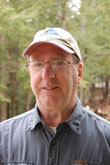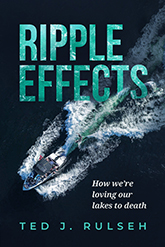|
Ripple Effects
How We're Loving Our Lakes to Death
Ted J. Rulseh
“A marvelously thorough synopsis of the many daunting issues surrounding lake management. Highly recommended.”
—John Bates, author of Wisconsin’s Wild Lakes: A Guide to the Last Undeveloped Natural Lakes
The go-to resource for lake dwellers and lake advocates of the Upper Midwest
Lakes are among the Upper Midwest’s greatest treasures and most valuable natural resources. The Great Lakes define the region, and thousands of smaller lakes offer peace, joy, and recreation to millions. And yet, in large part because of the numbers of people who enjoy the local waterways, the lakes of Wisconsin, Michigan, and Minnesota face numerous challenges. Invasive species, pollution, defective septic systems, inadequate shoreland zoning laws, and climate change are present and increasingly existential threats. We are, quite literally, loving our lakes to death.
In his engaging and conversational style, Ted J. Rulseh details each of these challenges and proposes achievable solutions. He draws on personal experience, interviews, academic research, and government reports to describe the state of the lakes, the stresses they are under, and avenues to successful lakeside living for a sustainable future. Ripple Effects will be a go-to source for all who love lakes and who advocate for their protection. Its driving question is summed up by one of Rulseh’s interviewees: “We love this lake. What can we do to keep it healthy?”
 Ted J. Rulseh writes “The Lake Where You Live” column and is active in lake-advocacy organizations. His books include A Lakeside Companion.
Ted J. Rulseh writes “The Lake Where You Live” column and is active in lake-advocacy organizations. His books include A Lakeside Companion.
Ted Rulseh's Website - https://www.thelakeguy.net/
Praise
“If you use these lakes, this is a must-read. . . . This well-researched book draws on personal experience, scientific reports, and research.”
—Silent Sports magazine
“This is a book that covers scientific and ecological problems, but it is written in a way that makes it understandable to the average guy without a science or natural resources background. . . . A great read for all of us who like our northern woods and waters and would like the environment to stay healthy. ”
—Free Pioneer Express
“This excellent follow up to Rulseh’s A Lakeside Companion covers all the major threats to our lakes. . . . Through it all he talks to numerous experts from Wisconsin and beyond.”
—Wisconsin Lakes
“A clarion call and much needed warning of how we are environmentally damaging our lakes and rivers throughout the Great Lakes states of Wisconsin, Michigan, and Minnesota. Exceptionally well written, organized and presented. . . . Unreservedly recommended.”
—Midwest Book Review
“This book will forever change how you think about lakes and the Northwoods.”
—Jake Vander Zanden, director of the Center for Limnology, UW–Madison
“Expertly weaves personal experiences and extensive research into an invaluable lake stewardship guidebook for anyone who loves lakes.”
—Jo Latimore, senior outreach specialist, Department of Fisheries and Wildlife, Michigan State University
“Rulseh’s rich and readable book tells us not only how intimately connected we are to our waters but how the fate of water is our fate as well.”
—Jeff Forester, executive director, Minnesota Lakes and Rivers Advocates
Table of Contents
Contents
Preface
Acknowledgments
1 A Lake, a Family
2 Cabin Country
3 Paradise Discovered
4 One Water
5 The Trouble with Phosphorus
6 Changing Lakescapes
7 Zoning and Its Discontents
8 Defective Septic Systems: How Big a Problem?
9 In the Wake
10 Stealth Invaders
11 Preventing the Spread: Holes in the Safety Net
12 Changing Climate, Changing Lakes
13 Loons under Stress
14 Pressure Rising
15 Ways Forward: Forging Connections
Epilogue: Toward a Land and Water Ethic
Notes
List of Interviews
Index
|

Larger images
New in Paperback!
February 2025
LC: 2021061604 QH
288 pp. 6 x 9
32 b/w illus., 10 tables
|

